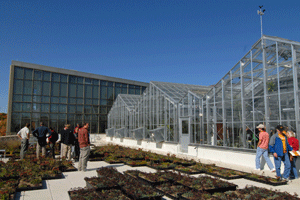Note: This article is over a year old and information contained in it may no longer be accurate. Please use the contact information in the lower-left corner to verify any information in this article.
St. Olaf's Regents Hall awarded highest LEED rating
November 13, 2009
|
|
| Regents Hall is the largest and most complex academic facility in the nation to earn LEED's prestigious platinum rating. |
St. Olaf College's Regents Hall of Natural and Mathematical Sciences has earned platinum certification -- the highest rating attainable -- from the U.S. Green Building Council's Leadership in Energy and Environmental Design (LEED) rating system. The nearly 200,000-square-foot, $63 million building is the largest and most complex academic facility in the nation to earn the prestigious platinum rating.
"Actions speak louder than words," says St. Olaf President David R. Anderson '74. "The LEED Platinum designation for Regents Hall demonstrates, once again, St. Olaf's leadership among American colleges and universities in sustainability practices."
LEED measures a construction project's use of state-of-the-art strategies for sustainable site development, water savings, energy efficiency, materials selection, and indoor environmental quality.
Sustainability in practice
With such features as a green roof, aggressive daylighting, and the minimization of chemical and biological waste, Regents Hall is not simply a model for responsible environmental stewardship, but a daily working example of sustainability in practice. Since opening in fall 2008, the building has become an invaluable teaching tool for the nearly 40 percent of St. Olaf students who pursue a major or concentration in the natural sciences or mathematics.
 |
| Large glazed areas use fritted glass to allow "aggressive daylighting" while cutting down unwanted solar heat gain, and call for less artificial lighting than would otherwise be needed. |
St. Olaf earned 57 credits on points ranging from indoor air quality to preferred parking for hybrid vehicles -- more than what LEED requires for platinum certification. Highlights of Regents Hall's sustainable features include:
- Compared to a building of its size that only meets code, Regents Hall saves enough energy each year to power some 250 homes annually.
- It is the first science facility -- anywhere -- designed to incorporate a green chemistry curriculum that uses water-based reactions to decrease lab waste and the need for conditioned air.
- Stormwater that runs off Regents Hall (already reduced by the water absorbed by the green roof) and the surrounding area is filtered through a series of ponds before reentering the aquifer.
- All wood and related forest products inside Regents Hall are free of formaldehyde and other volatile organic compounds, reducing total off-gassing and promoting cleaner indoor air. In addition, all wood used in the building was certified by the Forest Stewardship Council. Furniture in the building even includes tables and benches handcrafted from lumber harvested from the construction site.
- Lighting and temperature control systems are programmed to power down when spaces are not in use.
- Large glazed areas use fritted glass to allow daylight and views while cutting down unwanted solar heat gain, and call for less artificial lighting than would otherwise be needed.
- The many sustainable and easily maintainable materials used include long-life limestone (some of which was recycled from the building that previously occupied the site), recycled carpet and long-life linseed-based linoleum inside.
|
|
| In addition to helping with rainwater management, Regents Hall's green roof provides material for classroom experiments. |
Prior to earning the platinum rating, Regents Hall helped St. Olaf earn Xcel Energy's No. 2 "Efficiency Partner" slot -- one of 56 businesses the company honored last year for participating in its efficiency programs. Xcel also ranked St. Olaf No. 1 in natural gas efficiency.
St. Olaf has long been nationally recognized for its commitment to the sciences. From the high number of Ph.D. candidates in mathematics and the natural sciences who have received their undergraduate education at St. Olaf, to the college's consistent success at winning national science grants, St. Olaf is known for its innovative teaching and flagship undergraduate research programs.
Read what the Star Tribune and Post-Bulletin have written about Regents Hall.


